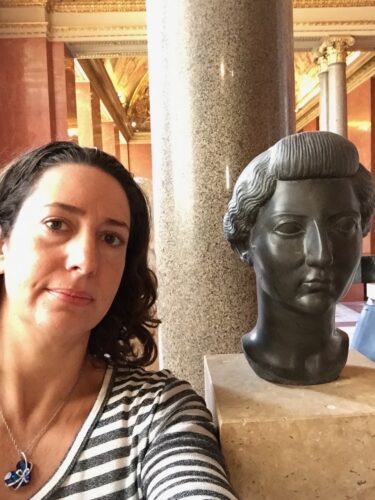Art history professor Kate Dimitrova has taught three classes with Wikipedia, but it wasn’t until she enrolled in a Wiki Scholars course that she became a more dedicated Wikipedia editor – and found exhilaration, fulfillment, and empowerment in the process.
“I find immense satisfaction in knowing that I am improving an article with accurate and current scholarship,” said Dimitrova, an expert in late medieval and early Renaissance tapestries at the University of San Diego. “In many ways, serving as a Wikipedia editor is like being a super publisher – I can make significant changes instantaneously to a range of subjects and topics for which I have subject expertise – making measurable and meaningful content.”
For Dimitrova, the professional development course designed for pre-modern European art experts was a chance to connect with a new network of scholars, professors, museum curators, and librarians, and to engage with scholarship in a new, incredibly impactful way.
“I truly think that editing on Wikipedia (either editing a current article or creating a new article) is a form of public scholarship that has far-reaching influence, particularly to readers who are outside the walls of academia,” said Dimitrova. “Although I have published a co-edited volume in the field of medieval art history, my contributions to Wikipedia have the potential to make an even greater educational and scholarly impact, in part because the audience is larger and I can also create content on a relatively short timeline.”

Dimitrova’s assessment of Wikipedia’s scholarly impact is supported by research, including studies shared by recent Wiki Education Speaker Series panelist Neil Thompson which highlight how the site can influence the content in academic publications.
To get started on Wikipedia, Dimitrova explored Stub-class to C-class articles from geographic regions that intersected with her research and teaching interests: Flanders, France, Spain, and Italy. As she began to edit the article on the Pastrana Tapestries, she quickly found herself “tumbling down a rabbit hole”, exploring other linked pages including one featuring 15th century leading tapestry dealer Pasquier Grenier, a name Dimitrova has repeatedly encountered throughout her three decades of research.
“I was dismayed by the sheer lack of sources and inaccurate information about him,” said Dimitrova, who changed course to enhance Grenier’s Wikipedia article. “I learned a lot of intriguing facts about him during my deep dive: he was a dealer not just in tapestries, but also in wine! Who knew!?”
Just as a hyperlinked page brought her to working on Grenier’s article, linked pages within the tapestry dealer’s article led her to editing other related articles, where she took pleasure in providing valuable and precise descriptions of works of art within her areas of expertise.
Although she has now completed her Wiki Scholars course, Dimitrova continues to work in her sandbox and edit on Wikipedia today, emphasizing its crucial role as a source of free, open access knowledge and underscoring the importance of Wiki Education trainings like Wiki Scholars courses and the Wikipedia Student Program for changing misperceptions of Wikipedia in academia.
“Academia’s long-propagated mistrust of Wikipedia as a viable academic source continues and students are still often advised not to use it,” Dimitrova explained. “However, I think that as more and more scholars and students alike become trained editors, they typically realize that Wikipedia’s system of ‘checks and balances’ is quite rigorous.”
Dimitrova expressed deep gratitude for Wiki Education’s Will Kent for his impactful instruction of the course, as well as for the course sponsor, the Samuel H. Kress Foundation, highlighting its vital support of pre-modern European art scholars as they work to contribute to the field.
